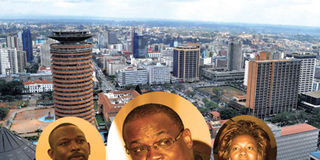You shouldn’t believe everything you read in those ‘expert’ economic reports

A view of Nairobi City. INSET: Nairobi County leaders from left: Senator Mike Mbuvi Sonko, Governor Evans Kidero and Women Representative Rachael Shebesh. FILE PHOTO | SALATON NJAU |
What you need to know:
- The Economist Intelligence Unit included Nairobi in its list of the top 20 of the world’s worst cities.
- Fortunately, not everything you read in economic reports is true.
Bad news comes by the shovelful, good news by the teaspoon.
So goes an old adage, certainly true when it comes to Kenya’s global business standing.
First, a spoonful of sugar. Never mind terrorism, criminal insecurity, and corruption.
A slew of fresh reports by major international banks and research institutes find that Kenya still ranks as one of the best places to invest in Africa.
Frontier Strategy Group in Washington, DC, tracks investment by 200 leading multinational corporations — including Coca-Cola, Dell, and General Electric.
According to its findings, Nigeria remains the most attractive sub-Saharan investment destination for US and European companies.
Kenya comes close behind — and leads decisively in East Africa.
The encouraging bottom line: Political and security troubles have not eroded business confidence in Kenya’s future, at least so far.
Corporate financial managers are a cautious lot. Not so the money men who run global private equity firms.
Hence the special interest of a report by Deloitte and Touche showing that investors with an appetite for risk prefer Kenya to all other countries in sub-Saharan Africa.
In a survey of 39 such funds, 74 per cent put Nairobi as their No. 1 choice.
Private equity funds invested three times as much in sub-Saharan Africa last year as in 2012 and Kenya drew a disproportionate share, accounting for nearly half of all deals in East Africa, far ahead of Uganda, Rwanda, or Ethiopia.
At the US-Africa summit last month, President Uhuru Kenyatta touted the country’s ambitious infrastructure development plans in energy, transportation, and information technology.
His reception was warm — but will the good vibes last? That depends, in part, on less happy news.
DUBIOUS GLOBAL SWEEPSTAKES
The World Economic Forum last week issued its annual Global Competitiveness Report, elevating Kenya six spots in its rankings to 90 out of 144 developing economies.
That is better than sinking, one must suppose — but Kenya is not in great company.
Meanwhile, the Economist Intelligence Unit included Nairobi in its list of the top 20 of the world’s worst cities.
SmartPlanet anointed it No. 2 in these dubious global sweepstakes.
Why? Pollution, crime, and a rising cost of living that makes the city Africa’s most expensive.
PricewaterhouseCoopers predicts that Nairobi and Dar es Salaam will join the ranks of global “super-cities” by 2030.
Whether that is a blessing or a curse depends on your confidence that Kenya can put this swelling new generation of youth to work.
At a meeting last week of the East Africa Association, Kenya’s biggest business boosters, confidence did not run high.
Some noted a startling new report from Standard Bank of South Africa, suggesting that a whopping 83 per cent of Kenyans live below the official $1.25 a day poverty line.
The country’s small middle class may be growing, it concluded, but the operative word is “small” — only four per cent of the population, compared to Angola at 29 per cent and Zambia at 10 per cent.
The latest UN Human Development Report highlighted the breadth of this national income gap. The richest 20 per cent of Kenyans enjoyed incomes 11 times higher than the poorest quintile.
Nervous talk of economic fundamentals did not improve the mood. Thanks to Al-Shabaab, tourism on the Mombasa coast is at death’s door.
Thanks as well to drought and disease, maize production is down sharply and food stocks are low.
Add in a looming trade war with Europe, uncertainties over devolution, political insecurity, and the rise of official corruption, and some might reasonably conclude that Kenya is sliding off the rails.
GRAIN OF SALT
Fortunately, not everything you read in economic reports is true. Consider Nairobi’s dismal standing in urban livability.
According to the ranksters, London also counts among the world’s least livable cities.
By contrast, the capital of the American rust belt, Detroit, was deemed a better place to live than either of these global capitals.
Really? Sorry, Detroit, but I defy anyone who has been there to choose Motown over our town. Bottom line: Read your economic studies with a grain of salt.
Michael Meyer is dean of the Graduate School of Media and Communications at Aga Khan University in Nairobi.




